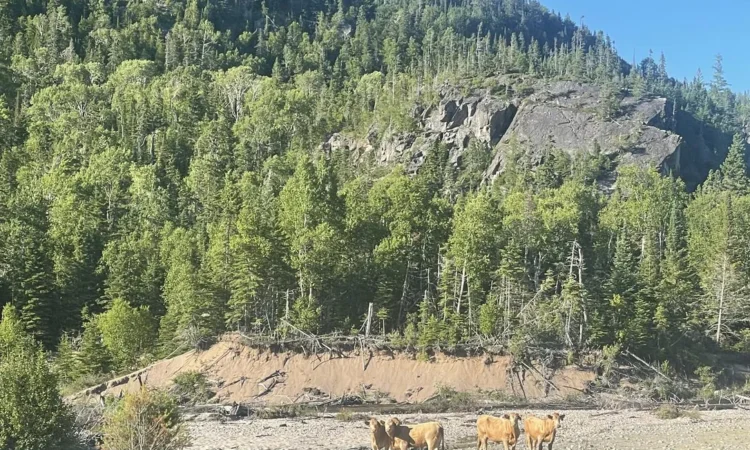The animals had been on their way to the slaughterhouse when the vehicle transporting them crashed.
Four cows sojourning near Lake Superior after escaping the slaughterhouse three months ago have met their end.
The Ontario Provincial Police Superior East detachment said the animals were euthanized.
“I can confirm that four of the cows had to be put down, as efforts to corral them failed and they had become a public safety concern,” said spokesperson Ashley Nickle in an email.
“We are not sure how many remain outstanding, if any.”
On May 14, the cows were aboard a truck heading to the slaughterhouse. As the driver steered along Highway 17 near Old Woman Bay early in the morning, another vehicle is said to have entered the oncoming lane. The cattle truck veered off the road and rolled into a ditch. Three cows were injured and subsequently euthanized. But between 40 and 50 cows escaped and made for the forest.
Most of the cows were gathered in the first few days, Nickle said. At least some ended up at a local farm, she noted.
A Star editor came across the four outstanding fugitives in the area over the Civic Holiday weekend.
Details about the circumstances around the euthanization are not known. The OPP previously said it would only approach the cows if they became a traffic hazard and there were multiple complaints from drivers.
A resident of nearby Wawa told the Star she saw the cows being put down on Aug. 2 while driving along the highway with a friend.
“We all heard when the slaughter truck went off the road in May and you would see the cows every so often,” said Emma Blanchet. “I would always see them on the side of the road, just grazing or drinking from the river.”
Blanchet, who doesn’t eat beef, reached out to animal sanctuaries earlier the same day to see if there was a way to rescue the cattle. She heard back from two, but neither could take them. But when Blanchet and a friend headed to the area for a hike that evening, they saw people poised to shoot the cows. After the hike, they saw the cows dead on the side of the road.
“I understand to an extent,” said Blanchet, noting it was unlikely for the cows to survive very long near the highway and especially during the area’s harsh winters. “I’m mad that I didn’t act sooner.”
Scott Tinney, a staff lawyer for Animal Justice, a Canadian animal law advocacy group, said he hoped authorities tried to find alternatives before euthanizing the livestock.
“If the cows were in a condition that they could have continued to live healthy, happy lives, then efforts should have been made … to try to send them to a rescue or a sanctuary as a priority,” he said, noting the group was not involved with the cows from this incident.
(It’s not known if the OPP or other authorities explored alternatives. A spokesperson for the detachment didn’t respond to requests for an nterview Monday.)
Blanchet’s friend said even though the cows were unlikely to survive in the wild, this was not the outcome she hoped for.
“They were just so resilient in the fact that they survived like they did, and it was really nice to see them,” said Jerah Frisque, who also lives in Wawa.
“It’s a crappy ending.”


